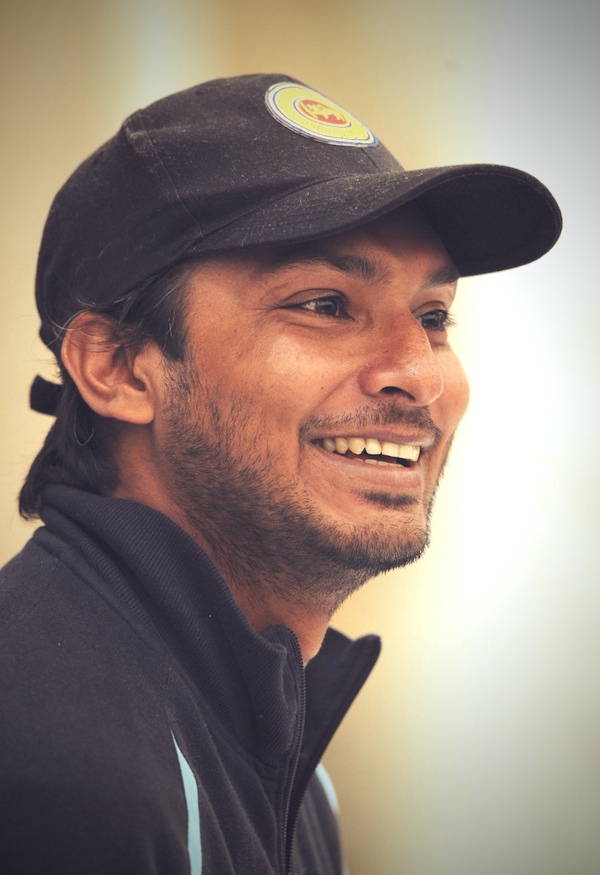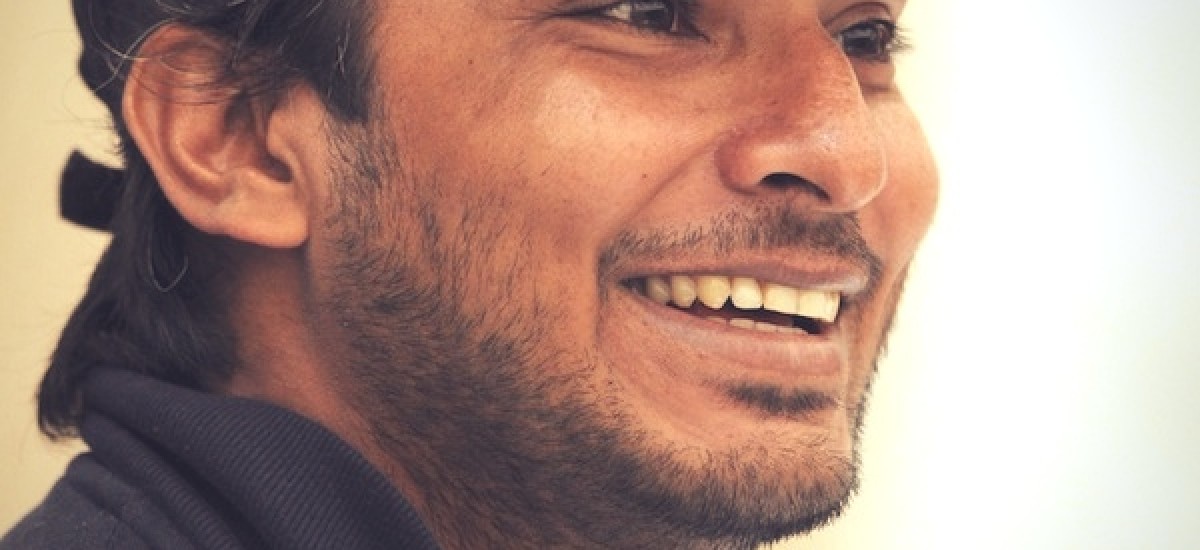
Photo courtesy Cric
When Kumar Chokshanada Sangakkara, Trinity Lion, Ryde Gold Medallist, and former captain of Sri Lanka, delivered what can only be called a magisterial oration at the 2011 MCC Spirit of Cricket Cowdrey Lecture at Lord’s on Monday night, he not only rapidly exhausted the stock of superlatives of his audience, reviewers and fans, but also became the first Cowdrey lecturer to receive a standing ovation since Desmond Tutu in 2008. As The Guardian observed, “August company indeed.” In many ways, it is difficult to imagine someone better than Kumar Sangakkara to deliver a lecture memorialising Lord Cowdrey, who was in his time the personification of the thinking man’s cricketer, and Sangakkara has repaid MCC President Christopher Martin-Jenkins’ confidence in full. From the organisation of his argument, its learned substance, the eloquence of its delivery, and above all, its acute self-awareness of which fights to pick and which to avoid, it is abundantly clear that cricket’s gain was the law’s loss. Here is an individual who would have shone as brilliantly as he has on the cricket pitch at the Bar, the appellate Bench, or in the highest reaches of legal scholarship.
In what is, to date, this elegant southpaw’s highest Test innings of 287 against South Africa at the SSC in 2006, it is interesting to note that he played 35 fours but not a single six. That is a measure of the classicism of his top of the order batting technique, enlivened by the stylishness that comes naturally to some left-handed batsmen, and I have in mind here Lara, Sobers, Gower and Saeed Anwar, rather than Ranatunga or Gurusinha or Gilchrist. It is a measure too, it seems, of this thoughtful man’s approach to and philosophy of life. “Choice words, and measured phrase; above the reach / Of ordinary men; a stately speech!” said Wordsworth, and timeously in view of Sangakkara’s imminent arrival in Edinburgh next week, “Such as grave Livers do in Scotland use.”
I will freely admit to a case of the goose bumps as I listened to the speech, not only because of the willing thrall to which one succumbs in the vocabulary and diction of this cricketing Demosthenes, but also because of the sentiments he expressed in his masterly portrait of what it means to be Sri Lankan in our time. In order to properly appreciate this latter aspect in particular, it is necessary to set the speech in context.
The immediate context is what has been a lacklustre tour of England, in which the absence of captivating cricket has drawn more attention than would otherwise have been the case to some of the more discomfiting aspects of Sri Lankan cricket, such as the absurd recall of Sanath Jayasuriya, M.P., and the farcical spectacle enacted by Dinesh Chandimal and Angelo Mathews at the death of the Lord’s ODI in which they sailed very close to the wind in regard to the spirit of both cricket and their team, and captain Dilshan lost both his cool and his dignity from the impotence of the dressing room. This latter episode is symptomatic, not merely of the lack of judgement – Chandimal’s pursuit of personal glory and Mathews’ misplaced loyalty – of two wonderfully talented but still manifestly immature players, but also of an attitude increasingly becoming the norm in Sri Lanka, that ends justify the means, that sense, judgement, conscience and individual responsibility have no role in the choice and legitimacy if not the legality of actions, and ultimately, of the acceptability of impunity. Sangakkara’s splendid account of the spirit of Sri Lankan cricket in its historical and social setting did more than adequately to show that the game we play and love in our country is much more than the uncouthness implicit in the behaviour of Chandimal and Mathews. The political dimensions of the speech also showed, in graceful contrast to Jayasuriya, how a thinking, questioning and informed citizen can be political in a democracy without also becoming a politician.
For no fault or responsibility of the Sri Lankan cricketers, the present tour also coincided with Channel 4’s documentary on war crimes, and the ensuing bad publicity and controversy that has cast such a miserable pall over our country. I do not want to get into the details of this here, but whichever polarised end of this febrile controversy one stands on, it is clear this is a ghost of war that will not stop rattling its chains until and unless a radically different approach – one that respects the credulity and goodwill of Sri Lankan citizens and the wider world – is adopted by the government in Colombo. It is of course neither Sangakkara’s role nor responsibility to undertake this task, but in showing that sanity, moderation, and the ideal of unity in diversity has not yet died in Sri Lanka, he has given succour to a silent majority of his countrymen who are relieved that the war is over, but are increasingly apprehensive about the disquieting reality of the intolerant peace that has replaced it.
The media have mainly picked up, as has the Sports Minister Mahindananda Aluthgamage – who is for all his Royalist pretensions and exhibitionist shenanigans in the Mustangs, a very ordinary man in the Wordsworthian sense – on Sangakkara’s critical observations on the vapidity, venality and violence of cricket administration in Sri Lanka today; which is understandable, but hardly fair to a lecture that was in substantive weight much more than that.
In setting out the nature of Sri Lankan cricket, its history, spirit and institutions, in the context of the social and political challenges that have confronted it, Sangakkara also articulated a worldview of Sri Lankan identity. In doing so, he was reasserting the democratic concept of civil society, and the point that articulations of the national condition are not the exclusive preserve of the ruling regime, or of politicians more generally. Informed, sceptical, critical citizens, especially those that play the role of social role models in the way that Sri Lankan cricketers do, and even more so those who like Sangakkara have contributions of quality to make, have a voice that deserves to be heard in the democratic marketplace of ideas. The risible rodomontade, dominated by populist nationalism, simplistic majoritarianism and authoritarian intolerance, that passes for political debate in our country today is not only seriously harmful to the future of our democracy, but also utterly unmerited, indeed preposterous, in a country that has formally been a democracy since 1931. So Sangakkara’s integrity and the courage of convictions that enabled him to say what he did is salutary in a broader democratic sense. The Sports Minister’s ominous announcement calling for a report on Sangakkara’s comments is a puerile, but sadly predictable, response from the ruling regime, which one hopes for all that is good and great about Sri Lanka, is not pursued with.
In substance, the vision of national identity and sense of contextualised individualism that form the subliminal undercurrent of Sangakkara’s speech hardly constitute a radical manifesto. It is a sensible, centrist, modern, pluralist worldview of unity in diversity that once used to be the stuff of mainstream, albeit high politics in Sri Lanka, and which was first enunciated by the Donoughmore Commissioners. As a society that has historically been exceptionally open to intercourse with the wider world, and within its Sinhala-Buddhist heritage, intrinsic but almost entirely unutilised resources with which to both tolerate and accommodate pluralism, Sangakkara’s views are nothing but the expression of common sense. In reaffirming this self-aware self-esteem, and in rejecting the kind of Orientalist caricature (exemplified in the famous Hargreaves cartoon of the princely Indian cricketer) he pointedly made mention of to his MCC audience, he was setting out a vision of what Kwame Anthony Appiah called ‘cosmopolitan patriotism’. In cricketing terms, the cosmopolitan patriot is one who subscribes to the universalism of the laws and spirit of cricket, but one who defends, with pride and principle, the unique ways in which different cultures and dispositions can enrich the shared game. Sangakkara spoke with affection and pride of many Sri Lankans who have contributed to this tradition in very different ways, including Arjuna Ranatunga, Muttiah Muralidaran and Mahadeva Sathasivam. But it is a tradition that goes back to Ranjitsinghji, and it is not difficult to extrapolate from this cricketing analogy a more general worldview about self and space, society and state.
To the extent this is seen as a departure from the current mainstream, then it is really a comment on how extreme and non-inclusive that mainstream has become. It is possible of course to quibble with the details, including as one friend asked me, how could he take such a critical attitude only to cricket administration but ignore the absence of a post-war constitutional settlement and the frenetic militarisation of the North? There are other issues; including in methodological and ideological terms, his reconstruction of history, his observations on socio-economic class, and especially, the stridently unitary ideal of national identity (i.e., that Sri Lankan unity is synonymous with one nation) that I find is neither necessary nor desirable for the telos of unity he so passionately defends. But I think it is both churlish and beside the point to nitpick. He has articulated a positive worldview of political moderation, and he has used that as a backdrop for his critique of cricket administration, which as an element of the broader panoply of issues relating to democratic governance we encounter in Sri Lanka, is important in its own right.
Taken within its own terms thus, the 2011 Cowdrey Lecture was a consummate piece of work that has raised a voice of integrity and decency in a post-war democratic debate that was going stale. In doing so, Kumar Sangakkara, Sri Lankan patriot and rooted cosmopolitan, has become something more than a cricketer, but quite what that is, remains to be seen. I hope in this that his ideal is C.L.R. James, not Imran Khan.

